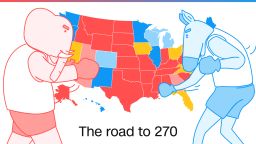Story highlights
GOP Senate candidates like Rob Portman and Marco Rubio could drive up Republican turnout, boosting Donald Trump
Some Republican candidates have been distancing themselves from Trump, who is trailing Hillary Clinton in key battleground states
The way the coattail effect usually goes, a popular presidential contender helps others in his party by bringing voters to the polls who, while there, end up pulling the lever for down-ballot candidates. But usual doesn’t apply to most things in 2016 – and coattails may be one of them.
In fact, some Republican operatives are looking at certain presidential battleground states with competitive Senate races such as Florida and Ohio, and wondering if this year, there could be a reverse coattails effect. Donald Trump could be the one benefiting from the good will GOP senators on the ballot have with voters in their states – keeping him within sight of Hillary Clinton in the presidential race.
Right now, polls in several competitive Senate races across the country show GOP candidates outperforming Trump.
The long-time concern among many Republicans who are very nervous about losing GOP control of the Senate, is that Trump will drag other Republicans down. The worry is that Republican voters who are turned off by Trump won’t show up on Election Day, and that will hurt GOP Senate candidates.
Yet others studying the data say they’re seeing something different. In states where the GOP senators are well-known and well-liked, especially among Republicans, it could end up drawing GOP voters to the polls, even if they’re skeptical of their presidential nominee.
Ohio is Exhibit A of where Republican strategists hope this reverse coattail phenomenon will happen. The latest public poll there from Monmouth University showed incumbent Republican Sen. Rob Portman up eight points over his Democratic opponent, former Gov. Ted Strickland. That same poll had Trump trailing Clinton by five points.
Among Republicans in Ohio, Portman is a brand name. He was first elected to the House in 1993 and has been a visible figure in that state ever since. Though his Democratic opponent is also a familiar face, well liked among his party faithful too, Republicans from Washington to Ohio are cautiously predicting a Portman win, arguing he is running one of the best re-election campaigns in the country.
“Rob Portman is running the best campaign I’ve ever seen in Ohio. His grassroots effort is unmatched and he’s talking to Ohioans of every political affiliation. Rob is the gold standard in Ohio politics,” said Alex Triantafilou, Republican Chairman of Hamilton County, Ohio.

Given that no Republican has ever won the White House without winning Ohio, Trump can use all the help he can get. And although Portman endorsed Trump, he is not campaigning with him, and openly criticized the nominee for several controversial comments.
Republicans looking closely at Ohio say they have their fingers crossed that Portman can continue to walk that line – be independent enough that GOP voters unsure about their nominee will still go vote for Portman, and once they’re there, feel compelled to vote for the guy at the top of the ticket too.
Disdain for Hillary Clinton may drive GOP vote
The thinking among those hoping for reverse coattails is that dislike for Clinton will compel those voters to go for Trump, even if it means doing so holding their noses.
It certainly may be wishful thinking, especially for Republicans in the “never Trump” category, but even Republicans who are not fans of the reality TV star-turned-politician think the anti-Clinton dynamic could be stronger among many traditional GOP voters.
“There are a lot of Republicans who think Trump is crazy but once they get in [the voting booth] they will be driven by their aversion to her,” said Sen. Lindsey Graham, a Trump GOP primary opponent who told CNN months ago he will not vote for either Trump or Clinton.

Graham predicts that about half of Republicans telling pollsters they would never vote for Trump will end up doing just that. But that will only happen if the voters have another reason to go to the polls, like to vote for Congress.
Graham argued that his good friend John McCain will help Trump in Arizona. Although he has been pummeled by his Democratic challenger Ann Kirkpatrick for supporting Trump as the nominee, McCain is another prime example of a political celebrity with a deep reservoir of goodwill among many in his state.
In a CNN/ORC poll in Arizona last week, McCain is outperforming Trump big time. Though Trump is beating Clinton 5 points, that is nothing compared to McCain’s 13-point lead against his Democratic opponent.
In Georgia, a Democrat hasn’t carried the state since Bill Clinton in 1992, but public polls show Hillary Clinton up there and privately some top GOP operatives tell CNN they worry Trump could lose. The one ray of hope among these GOP sources is Sen. Johnny Isakson, another candidate praised by GOP strategists for running a top notch campaign for a third Senate term.
Just like in Ohio and Arizona, GOP operatives are banking on the fact that there are enough voters who so dislike Hillary Clinton, that once they go vote for Isakson they will end up going for the top of the GOP ticket too.
Marco Rubio: Trump’s friend in Florida?
Florida may turn out to be a state with the strangest of bedfellows. Sen. Marco Rubio’s presidential bid ended after he lost the GOP presidential primary there to Donald Trump.
Now Rubio wants to keep his Senate seat, and that means sharing the ballot with Trump and appealing to the same voters.
Florida is such a diverse state, Republican operatives are hoping that Trump and Rubio will help each other. For example, where Trump is popular in the Panhandle, the hope is that he helps increase turnout that benefits Rubio. Rubio’s home turf is South Florida, with a high percentage of Hispanics and other voters who aren’t natural Trump supporters. The hope is Rubio could attract voters who would end up also pulling the lever for Trump.
Because they could help each other, some Republicans are even hoping Rubio campaigns with Trump. In an interview with CNN’s Manu Raju, the Florida senator, who had a particularly acrimonious relationship with Trump towards the end of his presidential run, didn’t rule that out.
“We’ll look at individual events on a case by case basis and see if it makes sense,” Rubio told CNN.
Florida is another battleground state where the Senate GOP candidate is outperforming Trump. A poll earlier this month from Monmouth University showed Trump trailing Clinton in the Sunshine State by 9 points, but Rubio beating his presumed Democratic opponent Patrick Murphy by 5 points.
Similarly, in Pennsylvania, Trump and Senate incumbent Pat Toomey may end up riding on each other’s coattails – just in different parts of the state. GOP State Party Chairman Rob Gleason said he thinks the candidates “will help each other” and that it all comes down to “a tale of two Pennsylvanias” – his way of describing the disparate nature of the state’s electorate.
Poll: Clinton has comfortable lead in Pennsylvania
Gleason believes Trump could give Toomey a boost in the northeastern and central parts of the state, areas where the nominee is currently polling far ahead of Hillary Clinton 58% to 28% in a new Monmouth poll. But, Gleason says he sees Toomey with an advantage in the Philadelphia area and in the Lehigh Valley – where Republican Congressman Charlie Dent has already said he has “no plans” to vote for Trump.
Gleason says he doesn’t think those Republican voters will consider a split ticket. “I think at the end of the day the people who vote for Toomey will probably end up voting for Trump. So I think Toomey will help in that way.”
Still, Senate candidates like both Toomey and Rubio are keeping their focuses squarely on their own races. The Monmouth poll out Tuesday shows Toomey running ahead of Trump, but still behind his Democratic opponent by four points. Toomey has yet to throw his support behind Trump’s candidacy and in a call with reporters earlier this month said he believes voters “will make a completely separate decision about the person they want representing them in the United States Senate.”
Rubio echoed a similar sentiment about his race, telling Raju, “You can’t take it for granted if the top of the ticket wins, and then you have a chance to win even if it doesn’t.”
But, at least in Pennsylvania, Gleason believes the fine line Toomey is walking with respect to his party’s nominee is both working and could bring in voters. “They are both getting into different homes,” Gleason said. “If they were both on the same wave length, there are some homes they wouldn’t get in.”
In some states, reverse coattails may not work
CNN/ORC’s poll last week in North Carolina showed both the presidential contest and the Senate contest to be dead heats. Republican strategists see that as bad news for the incumbent Sen. Richard Burr. Although the chair of the Senate Intelligence committee is respected by colleagues on both sides of the aisle, unlike other GOP senators in tough fights this year, he is not seen as top-notch campaigner.
Trump’s son: Dad’s immigration position not ‘softening on anything’
Democrats have already signaled they intended to unload on Trump in North Carolina, where Barack Obama won in 2008, but then lost in 2012. Several Republican sources tell CNN they fear Burr will have a hard time overcoming getting mortally wounded by a Democratic onslaught in that state.
Overall, the notion of reverse coattails could be wishful thinking by Republican operatives constantly trying to make sense of such an unpredictable year for their party. But if they’re right – and this year’s unusually high number of competitive GOP seats ends up helping Trump – it will be pretty high on the long list of topsy-turvy politics that defines 2016.




